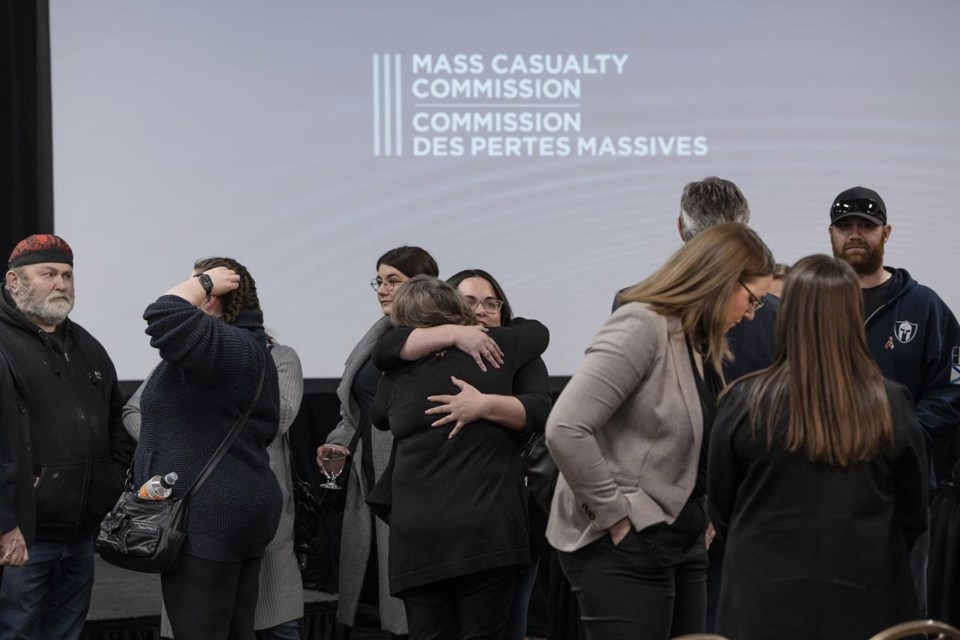HALIFAX — The federal and Nova Scotia governments rolled out an $18-million plan Friday aimed at helping people still suffering from mental health, grief and bereavement challenges three years after the worst mass shooting in Canadian history.
The announcement was in response to a public inquiry that released its final report last month into the tragedy in northern and central Nova Scotia, where 22 people were shot dead by a man disguised as a Mountie on April 18-19, 2020.¬Ý
"This is just the beginning," said Brian Comer, Nova Scotia's minister responsible for addictions and mental health, who was joined at a news conference via video link by Carolyn Bennett, the federal minister of mental health and addictions. "We know we need to move quickly on this."¬Ý
But a leading critic of the provincial government's efforts to help residents in the aftermath of the shootings said the two-year plan is flawed. Among other things, the province plans to hire clinical and front-line staff to deliver community-based care, but that goal will prove difficult to reach, said Alec Stratford, executive director of the Nova Scotia College of Social Workers.
"The ability to get more staff in there is already challenged by all of the recruitment issues that we face," Stratford said in an interview Friday.
As well, he took aim at the province's plan to use existing staff to establish a mobile clinical team that will be expected to offer a range of health and wellness services in the most affected communities in Cumberland, Colchester and Hants counties.
"There have been staff members who were trying to do this work for the last three years and they are beyond burnt out at this point in time," Stratford said. "It's going to deepen that level of burnout and stress."
The inquiry, known as the Mass Casualty Commission, issued 130 recommendations to prevent a similar tragedy and improve community safety and well-being across Canada. Its call for more mental-health supports came with the commission's first deadline: May 1.
On that date, one outreach worker will begin travelling to affected communities to provide mental wellness supports, said Comer. And as of May 6, the mobile team will start offering their services, but only on Saturdays.
The province is also in the process of hiring a "clinical grief lead" who will be responsible for providing expertise in grief and bereavement services. And there are plans to bring in grief and bereavement specialists, mental-health clinicians and nurse practitioners, but Comer could not say how many people would be hired.
The minister said a long-term strategy would be developed once consultations with residents have been completed, but he did not commit to spending more money on the plan announced Friday — even though it calls for an expansion across the province and impact assessments later this year and in 2025 and 2028.
"I won't presuppose that," Comer said.
Stratford said $18 million was a good start, "but if we're talking about big-picture, long-term mental health, then the investment needs to be much more significant than that."
As well, Stratford noted that when the provincial government was presented with a provincewide grief strategy in late 2020, a decision was made to shelve that plan. "They couldn't comprehend it," he said.
The commission of inquiry's final report included withering criticism of Nova Scotia's failed attempts at providing adequate mental-health, grief and bereavement support during the past three years.
Among other things, the commission found there were delays in providing what limited assistance was available. People were not given direction on how to connect with counsellors, and some residents had to recount their traumatic experiences repeatedly as they navigated a system that created "a healing deficit and ‚Ķ broken trust."¬Ý
The report says the government's inaction could "lead to further cycles of violence and trauma."¬Ý
On Friday, Comer admitted the province's response fell short. "In the days, weeks and months after the tragedy, there was a lot of work on the ground that did occur, but we heard very clearly from the report that wasn't enough," he said.
Bennett also noted the shortcomings highlighted by the commission. "There's not a family across Nova Scotia who hasn't been impacted by this terrible tragedy," she said. "Right now, we are coming together to take much-needed action. The public is demanding change, and for a very good reason. It is clear there were failures."
Later in the day, Nova Scotia's opposition NDP leader, Claudia Chender, said the joint announcement was a good start. "Over the last three years we have heard from those in the communities directly affected that they needed more support," Chender said in a statement. "
And while I believe the government could have acted sooner and provided more mental-health care supports, I'm glad to see that starting Monday there will be a dedicated response."
This report by The Canadian Press was first published April 28, 2023.¬Ý
Michael MacDonald, The Canadian Press




